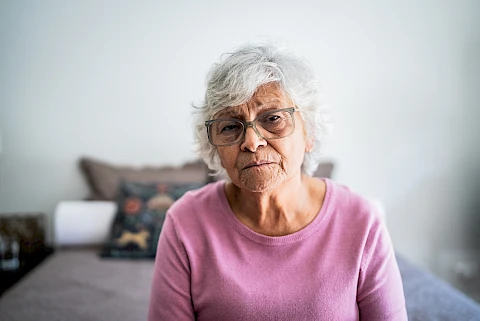
Depression affects many seniors, but it remains underdiagnosed. Many seniors endure silently, as symptoms are often mistaken for the natural aging process or other health conditions. Paying attention to changes in your senior loved one's mood, behavior, and physical health, and knowing when to seek help can make all the difference in ensuring they get timely care and support.
Older Adults and Depression
Depression in seniors can arise from a variety of causes. Life changes like retirement can lead to a loss of purpose. Isolation due to decreased mobility or loss of loved ones can heighten vulnerability. Health problems, including chronic illnesses, also play a significant role.
The way depression manifests in seniors can differ from how it appears in younger individuals. Seniors may experience more subtle emotional changes, which can further complicate diagnosis. A medical professional can help distinguish depression from other conditions, but you should remain vigilant to signs that may otherwise be overlooked.
Identifying Signs of Depression
Emotional, physical, cognitive, and behavioral changes are common indicators of depression in seniors. Emotionally, seniors may exhibit persistent sadness, hopelessness, or irritability. Physically, you might notice changes in appetite, sleep disturbances, or fatigue.
On a cognitive level, depression can lead to difficulty concentrating or memory problems. Behaviorally, seniors might withdraw from social activities or neglect personal care. Recognizing these signs is critical in providing help.
Effective Communication Strategies
Starting a conversation about mental health with seniors requires sensitivity and patience. Choose a comfortable setting and express your concerns without judgment. Listen actively and show empathy. Encourage open dialogue without pushing for immediate solutions. Sometimes, simply having someone listen is therapeutic. Let them know they are not alone and that it's okay to seek help.
Support Resources for Seniors
Mental health services, such as counseling and therapy, are vital resources for seniors struggling with depression. Many community organizations and senior-specific support groups provide an avenue for others facing similar challenges. Professional caregivers can also offer specialized care, creating a safe space for seniors to express their feelings. Don't hesitate to explore these options and encourage your senior loved one to access the help they need.
Early Recognition and Appropriate Response
Early detection of depression ensures better outcomes, making intervention crucial. If you suspect a senior is experiencing depression, gently express your concerns and suggest seeking professional help. Encourage treatments such as therapy or medications and offer support in attending appointments. Stay engaged by checking in regularly and ensuring they adhere to their treatment plans. Your encouragement can significantly enhance their recovery journey.
Nurture Senior Well-Being With Personalized Support From Senior Helpers
Recognizing depression in seniors and addressing it promptly can significantly improve their quality of life. If you need personalized support for a senior loved one in Bryan, Conroe, College Station, Livingston, and Montgomery, Senior Helpers Bryan-CollegeStation-TX can help. Our doors are open to supporting you in providing the care your loved ones deserve, from companionship and conversation to help with daily living activities and more. Contact us to learn more about our senior home care services!